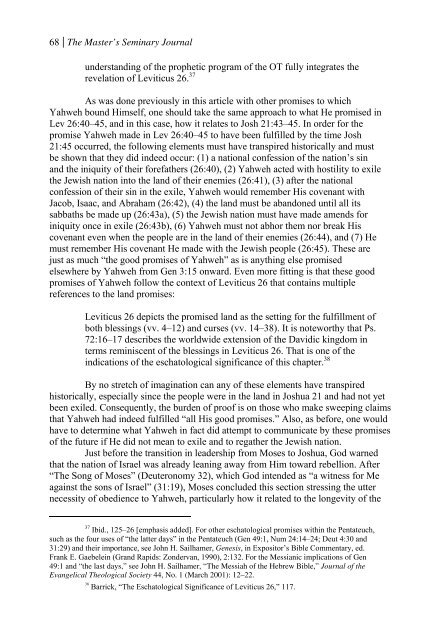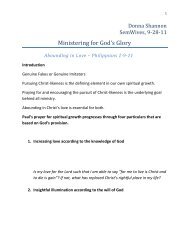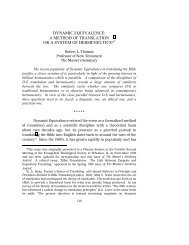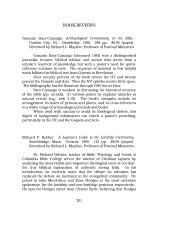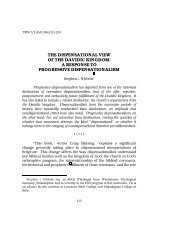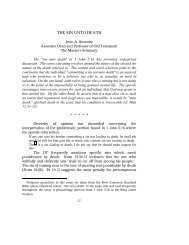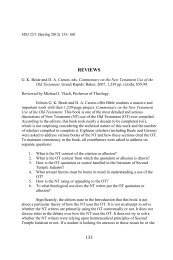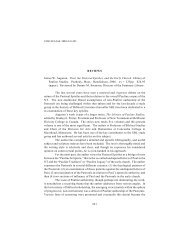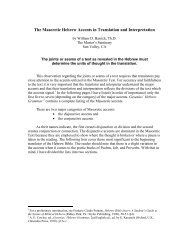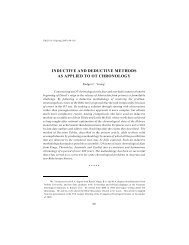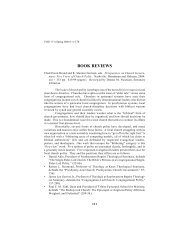Did God Fulfill Every Good Promise? - The Master's Seminary
Did God Fulfill Every Good Promise? - The Master's Seminary
Did God Fulfill Every Good Promise? - The Master's Seminary
Create successful ePaper yourself
Turn your PDF publications into a flip-book with our unique Google optimized e-Paper software.
68 | <strong>The</strong> Master’s <strong>Seminary</strong> Journalunderstanding of the prophetic program of the OT fully integrates therevelation of Leviticus 26. 37As was done previously in this article with other promises to whichYahweh bound Himself, one should take the same approach to what He promised inLev 26:40–45, and in this case, how it relates to Josh 21:43–45. In order for thepromise Yahweh made in Lev 26:40–45 to have been fulfilled by the time Josh21:45 occurred, the following elements must have transpired historically and mustbe shown that they did indeed occur: (1) a national confession of the nation’s sinand the iniquity of their forefathers (26:40), (2) Yahweh acted with hostility to exilethe Jewish nation into the land of their enemies (26:41), (3) after the nationalconfession of their sin in the exile, Yahweh would remember His covenant withJacob, Isaac, and Abraham (26:42), (4) the land must be abandoned until all itssabbaths be made up (26:43a), (5) the Jewish nation must have made amends foriniquity once in exile (26:43b), (6) Yahweh must not abhor them nor break Hiscovenant even when the people are in the land of their enemies (26:44), and (7) Hemust remember His covenant He made with the Jewish people (26:45). <strong>The</strong>se arejust as much “the good promises of Yahweh” as is anything else promisedelsewhere by Yahweh from Gen 3:15 onward. Even more fitting is that these goodpromises of Yahweh follow the context of Leviticus 26 that contains multiplereferences to the land promises:Leviticus 26 depicts the promised land as the setting for the fulfillment ofboth blessings (vv. 4–12) and curses (vv. 14–38). It is noteworthy that Ps.72:16–17 describes the worldwide extension of the Davidic kingdom interms reminiscent of the blessings in Leviticus 26. That is one of theindications of the eschatological significance of this chapter. 38By no stretch of imagination can any of these elements have transpiredhistorically, especially since the people were in the land in Joshua 21 and had not yetbeen exiled. Consequently, the burden of proof is on those who make sweeping claimsthat Yahweh had indeed fulfilled “all His good promises.” Also, as before, one wouldhave to determine what Yahweh in fact did attempt to communicate by these promisesof the future if He did not mean to exile and to regather the Jewish nation.Just before the transition in leadership from Moses to Joshua, <strong>God</strong> warnedthat the nation of Israel was already leaning away from Him toward rebellion. After“<strong>The</strong> Song of Moses” (Deuteronomy 32), which <strong>God</strong> intended as “a witness for Meagainst the sons of Israel” (31:19), Moses concluded this section stressing the utternecessity of obedience to Yahweh, particularly how it related to the longevity of the37 Ibid., 125–26 [emphasis added]. For other eschatological promises within the Pentateuch,such as the four uses of “the latter days” in the Pentateuch (Gen 49:1, Num 24:14–24; Deut 4:30 and31:29) and their importance, see John H. Sailhamer, Genesis, in Expositor’s Bible Commentary, ed.Frank E. Gaebelein (Grand Rapids: Zondervan, 1990), 2:132. For the Messianic implications of Gen49:1 and “the last days,” see John H. Sailhamer, “<strong>The</strong> Messiah of the Hebrew Bible,” Journal of theEvangelical <strong>The</strong>ological Society 44, No. 1 (March 2001): 12–22.38Barrick, “<strong>The</strong> Eschatological Significance of Leviticus 26,” 117.


